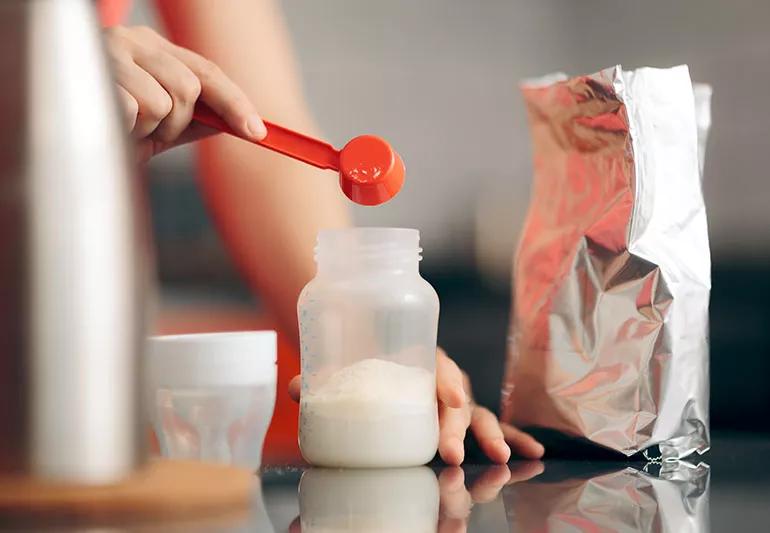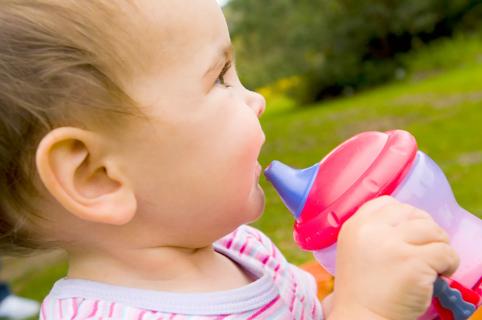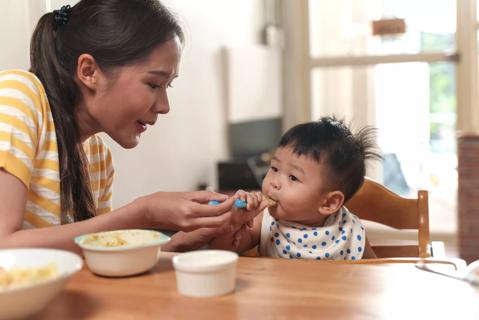Get the 101 on formula, from preventing illness to ensuring your child gets all the nutrients

You decided on a formula and bought a set of baby bottles — and now it’s go time. But what exactly do you do? Pediatric dietitian Andrea Adler, RD, CSP, CSPCC, LD, explains the ins and outs of preparing and storing baby formula.
Advertisement
Cleveland Clinic is a non-profit academic medical center. Advertising on our site helps support our mission. We do not endorse non-Cleveland Clinic products or services. Policy
For many parents, formula is essential in the first year of feeding their babies. So learning how to make baby formula is a crucial skill. It’s not hard, but it’s important to follow a few guidelines:
Always follow the directions on the container for how much formula and water to use unless your pediatrician or pediatric registered dietitian recommends otherwise.
You might be surprised to learn that tap water is usually the best water to use with formula. “Tap water is safe to use for mixing with infant formula,” reassures Adler. “It contains fluoride, which is beneficial for teeth even before they start to show above the gums.” Have a home filtration system? That’s OK since fluoride typically remains in the tap water after being filtered.
On the other hand, distilled, purified, deionized or demineralized water doesn’t contain fluoride. Plus, bottled water isn’t sterile, says Adler, except baby or nursery water, which has been boiled before being bottled. Bottled water also can become contaminated if it sits on the shelf too long.
Advertisement
Note: If well water comes through your tap, make sure it’s tested regularly for safety through the local health department.
There’s no need to heat formula. According to Adler, there’s no harm in giving your child formula that’s cold or room temperature. But if you do want to warm it up, avoid putting formula in the microwave. Uneven heating can create scalding spots that can burn your baby’s mouth.
The best way to heat formula is by using a store-bought bottle warmer or placing the bottle in a bowl of hot water. These methods gently heat the formula. But it’s a good idea to test how hot it is before giving it to your child. Let a few drops fall on your inner wrist. If it’s a comfortable temperature, it’s ready for your little one.
As long as your child is healthy, you don’t need to boil the water, states Adler. But if it gives you peace of mind, go ahead. Just make sure the water cools completely before mixing it with formula so as not to burn or scald the caregiver or the baby. Boiling hot water also can break down some of the nutrients in formula.
Washing bottles with soap and water removes germs, but exposing them to high heat (sterilizing) takes it one step further. “I do recommend sterilizing bottles and nipples before using them the first time,” Adler says. “But after that, thoroughly washing them with soap and water is fine.”
However, if your child has a compromised immune system or was born prematurely, you may need to regularly sterilize their bottles. Ask your pediatrician if this step is necessary for your child.
There are a couple of ways to sterilize bottles. The cheapest route is to place them in boiling water for five minutes. But you can also purchase a bottle sterilizer, which uses steam to kill germs.
If you have questions about what bottles to use, read what a pediatrician says about the safety of plastic bottles and other alternatives.
Generally, you want as little time as possible between preparing the bottle and feeding it to your child. Any prepared formula — mixing powder or concentrate with water or opening a ready-to-feed formula bottle — can sit out at room temperature for two hours. After that, you should feed it to your baby or refrigerate it, says Adler.
In the fridge:
It’s best to make the bottle right before giving it to your child. But that can be a hassle in the middle of the night.
“During the daytime, I recommend that you make the bottle roughly before you’re going to feed it,” Adler says. “But for overnight feeds, it’s convenient to make bottles up before you go to bed and put them in the fridge. They’ll stay good for 24 hours, so you can quickly grab one at 3 a.m.”
Advertisement
Toss leftover formula. Once you’ve started feeding your baby from the bottle, the formula is good for just one hour. That’s because the baby’s mouth introduces bacteria to the nipple.
“It’s like how you wouldn’t want to take a sip of milk, let it sit out a couple of hours and then drink it again or put it in the fridge for later. The risk of spoilage is too high,” explains Adler.
The unopened formula you have sitting in your pantry is good until the expiration date on the cans or ready-to-feed bottles. Once opened, powdered formula lasts one month. After that time, formula makers can’t guarantee nutrition quality. It’s best to start with a fresh can.
Bottle-feeding is one of the many skills new parents have to learn, but within no time, you’ll be a pro. With these tips in mind, you can keep your little one safe, nourished and healthy.
Advertisement

Sign up for our Health Essentials emails for expert guidance on nutrition, fitness, sleep, skin care and more.
Learn more about our editorial process.
Advertisement

In babies under 12 months old, cow’s milk has been associated with gastrointestinal bleeding

No juice until your child is 1 year old — and even then, they shouldn’t have much, if any

Ultimately, the choice depends on what works best for you and your baby, but it’s also important to be aware of the pros and cons of both

Ideally, you want your toddler to be drinking from a ‘big kid cup’ by age 2

Letting your baby feed themself foods the whole family enjoys has its benefits — but stick to softer foods and follow safe-eating guidelines

Levels are generally low, but there are ways to minimize potential health risks

Slowly introducing cow’s milk (or soy milk) can help your child make the change

In babies under 12 months, honey may cause a serious illness called infant botulism

Even small moments of time outdoors can help reduce stress, boost mood and restore a sense of calm

A correct prescription helps your eyes see clearly — but as natural changes occur, you may need stronger or different eyeglasses

Both are medical emergencies, but they are very distinct events with different causes